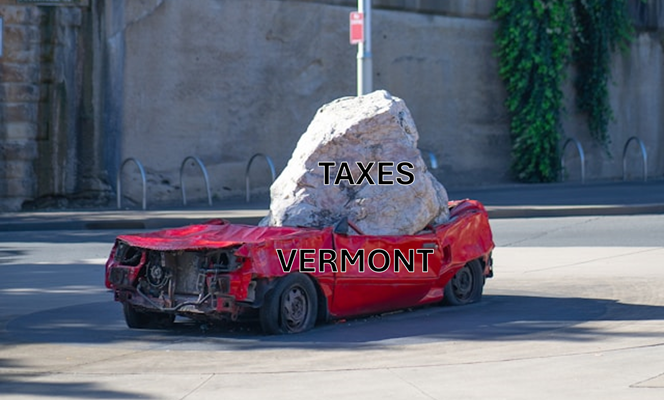When it comes to the unaffordable climate change policies being pushed on Vermonters by the Democrat majority in the State House, the Clean Heat Standard for the home heating sector has received all the attention for the past couple of years, but heat only represents about 40 percent of the state’s greenhouse gas emissions. The other equally large culprit is transportation – Vermonters driving to and for work, school, the grocery store, etc. Now, nearly five years after passing the Global Warming Solutions Act (GWSA) and two months after the first (Jan 1, 2025) GHG reduction deadline under that law has gone by the wayside, we have a proposal for dealing with transportation emissions – and a price tag!
The program is called “Cap and Invest” (euphemisms for tax and spend), and the way it would work is to set a limit (cap) on the amount of fossil fuels allowed to be sold in Vermont, and the state would collect revenue by auctioning off allowances to fuel dealers to sell such fuels up to the capped amount. How much would those allowances cost Vermont drivers if we intend to meet the next deadline under the GWSA? More than $177 million per year.
In testimony to a joint meeting of the House and Senate Transportation Committees, Cambridge Systematics, the consulting firm hired at a cost of $500,000 to evaluate the program, presented a number of scenarios including “low price,” “medium price,” and “high price” options. The “low price” scenario would cost Vermont drivers $32 million per year. The “high price” option came in at $177 million.
But here’s the problem…. Even the $177 million per year tax on gasoline and diesel, according to the study, isn’t enough to meet the 2030 targeted mandates of the GWSA. Actually meeting the mandates in the law would cost even more than that.

That’s not the only problem….
As the report notes, “Vermont is a small state, and it would be a significant administrative burden to create its own, stand-alone program…. The two [other] options potentially available in North America are: 1. Western Climate Initiative (WCI) – Current participating entities include California and Quebec; Washington State is using the WCI emissions trading platform and is considering linking with the participating entities. 2. New York Climate Initiative (NYCI) – Under development by New York State.”
So, we can’t do this by ourselves, so scratch that option. As for joining the New York program, the problem there is that it doesn’t exist yet and possibly never will. Like Vermont, New York seems to be coming to the grudging realization that it bit off more than it could chew with these carbon policies and is balking at implementation. Even if they do eventually put their plan into practice, it will be too late for Vermont to meet our 2030 deadline. So, if we have any real intention of meeting our legally binding 2030 GWSA mandates, scratch that option. That leaves joining the Western Climate Initiative (WCI) with California and Quebec. But, again, there are problems.
First, WCI doesn’t just cover gasoline and diesel, it is “economy wide” also applying to home heating fuels (this has been mentioned as a replacement for or supplement to the now dormant Clean Heat Standard) and industrial processes. That would bump the total Vermont tax burden for this program up to an estimated $336 million per year.
State Treasurer Mike Pieciak testified that joining the WCI would mean Vermonters would see at least an immediate 26-cent per gallon tax increase on gasoline and diesel and 30 cents per gallon on home heating fuels with a mandated 5 percent increase each year. He also pointed out that if Vermont were to add this level of taxation to fuel, it would certainly lead to border-hopping into New Hampshire, Massachusetts, and New York for fuel purchases and potentially other economic activity as a result. He recommended joining New York’s program – which, as mentioned above, doesn’t exist. So… yeah….
A final problem with this and all of the carbon reduction schemes is that it is horribly regressive. Low-income Vermonters are hit with a double whammy: they already spend a higher percentage of their incomes on transportation and heating fuels and would be hardest hit by the increased prices, and they are less likely to be able to afford on their own upfront costs of switching to non-penalized fuel sources. As such, Pieciak estimates that at least 40 percent of all revenue raised from the gasoline and diesel tax would have to go to some sort of welfare program to mitigate the impact on low-income Vermonters. Another 10 percent would have to be allocated to new bureaucracy to administer that program. So, Vermonters would be paying, in Pieciak’s round numbers example, $100 million in taxes to pay for a $50 million program.
And this, folks, is why Vermont is unaffordable.
When Vermont Democrats passed the Global Warming Solutions Act over the veto of Governor Scott and the Republican minority, they had no idea how much meeting the mandates in the law would cost or if they were even logistically possible to meet. This cart before the horse approach was and is incredibly irresponsible governance. But now – after wasting multiple millions of dollars and five years on studies – we have the answers: way too much, and not at all.
The Clean Heat Standard is found “not suitable for Vermont.” The transportation proposals that do exist are not suitable either, and the one that is, well, doesn’t exist. Just maybe the conclusion we should draw at this point is that the Global Warming Solutions Act as a whole is not suitable for Vermont, and we should repeal it. Now.
